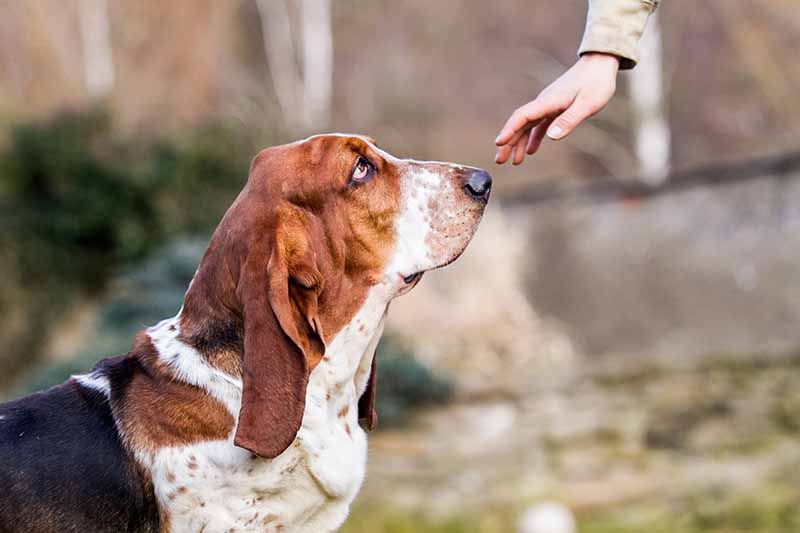In this article
View 2 More +If you are thinking of bringing home a new dog, there are several factors to consider. Your time, energy, and finances are among them, but the nature of the breed is another.
If you are considering bringing a Basset Hound home, you have likely heard wonderful things about the talented dog. They are known to be patient and easy-going, with charming temperaments. You may have also heard less positive things, such as the Basset Hound’s tendency to bark.
While it is true that Basset Hounds bark more excessively than other breeds, it is something that you can train your Basset Hound to stop doing.

Basset Hound Personality
The Basset Hound is a popular, appealing breed. They are easily recognized for their charming faces, long ears, and low-slung bodies. They were initially bred in France and Belgium for hunting. Basset Hounds were also bred to be pack dogs, helping them get along with other pets and people easily. Though they can be independent at times, they are great with children and other dogs.
Although Basset Hounds are not watchdogs with an overly vigilant nature, they are still known to bark often. Without proper training, they may become nuisance barkers. Training a Basset Hound not to bark can be easier said than done, as Basset Hounds can be somewhat independent.

Training Basset Hounds
Although Basset Hounds can be stubborn, they can (and should) be trained. Basset Hounds are intelligent dogs capable of learning any task you set in front of them. However, it can be a little more challenging to instill obedience training in a Basset Hound compared to other breeds. Because of this, you will need to be prepared to dedicate more time and energy to training your Basset Hound.
When training your Basset Hound, it is essential to remember that the breed was designed with the ability to hunt on its own. The independence we may perceive as stubbornness is just the Basset Hound fulfilling what it was bred to do. Approaching training sessions with this awareness is an excellent way to make the most of each session.
One tip for training Basset Hounds is to establish expected routines early on. If your Basset Hound knows when it will be fed, walked, and taken out of its crate, it will be unlikely to bark from stress. Likewise, make it clear that you are the master of the household. When your Basset Hound knows you are in charge, your commands will be more readily obeyed.

How to Stop Excessive Barking in 3 Steps
But how do we stop the excessive barking?
1. Determine the Cause of the Barking
It can be easy to dismiss a dog’s excessive barking as meaningless, but that’s rarely the case. Our dogs can only communicate with us through vocalization, so if your Basset Hound is barking a lot, what is it trying to tell you?
There are several legitimate reasons your Basset Hound may be barking, such as distress or frustration. If your dog is unable to access its food and water, unable to find you or another loved one, or is poorly stimulated, it may bark to try and draw attention to the issue.
A medical issue may also cause your dog’s excessive barking, which is why it is crucial never to assume that constant vocalization is simply barking for barking’s sake. Once you and the vet have ruled out the possibility of a medical condition, start looking for factors in your dog’s environment that may be causing it to bark.
If you need to speak with a vet but can't get to one, head over to PangoVet. It's our online service where you can talk to a vet online and get the advice you need for your pet — all at an affordable price!

2. Positive Reinforcement Is the Most Effective
When your Basset Hound is barking, your instinct may be to scold the dog. However, scolding is not very effective with Basset Hounds. Instead, look for ways to offer your dog positive reinforcement for the behaviors you approve of.
3. Teach Your Basset Hound to “Speak” and to Be Quiet
It may sound counter-intuitive, but training your Basset Hound to “speak” can be very effective, as long as you teach it to quiet down. Command the dog to “speak,” and when it barks a few times, provide a reward. Then, while it is barking, use the command “quiet.”
If it stops barking, give it a treat. By repeating this training frequently, you can teach your Basset Hound that the command “quiet” must be followed by silence.


Conclusion
Although Basset Hounds are known to bark, they are more than capable of learning to be quiet. When training a Basset Hound, it is crucial to be aware that Basset Hounds were bred to be independent and respond best to positive reinforcement.
If you are ever feeling out of your depth while training your Basset Hound, don’t hesitate to speak to your vet or contact behavioral specialists for support.
See also:
- 10 Interesting Basset Hound Facts To Know (Vet Approved)
- How Much Does a Basset Hound Howl? Facts & FAQ
Featured Image Credit: Mary Swift, Shutterstock

















